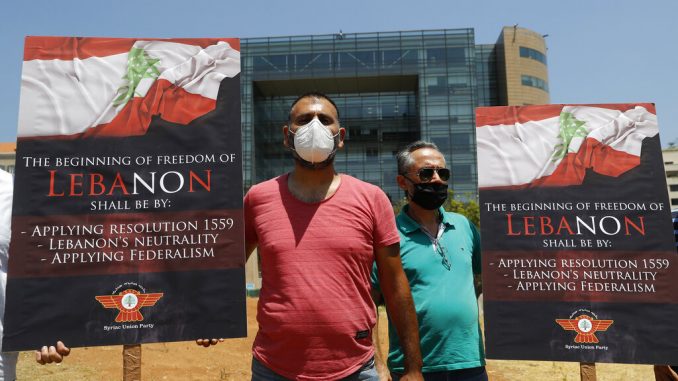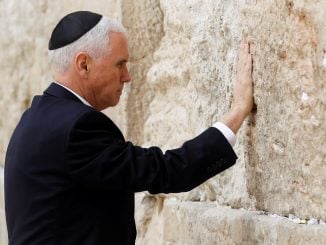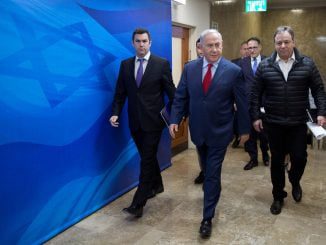
JERUSALEM — The Israeli military on Monday said it thwarted an infiltration attempt by Hezbollah militants — setting off one of the heaviest exchanges of fire along the volatile Israel-Lebanon frontier since a 2006 war between the bitter enemies.
Neither side reported casualties during a battle that raged for over an hour, and Hezbollah denied involvement. But the Israeli military said it was sure the Iranian-backed militant group had carried out the operation, and Israeli forces in the area remained on heightened alert.
Israel had been bracing for an attack since an Israeli airstrike in neighboring Syria killed a Hezbollah fighter last week. Following the airstrike, the Israeli-controlled Golan Heights was hit by explosives fired from Syria on Friday. Israel responded by attacking Syrian military positions and beefing up its forces in the area.
“Hezbollah and the state of Lebanon bear full responsibility for this incident and any attack that comes from Lebanese territory against the state of Israel,” Israeli Prime Minister Benjamin Netanyahu said in a televised address.
“Hezbollah needs to know that it is playing with fire. Any attack against us will be answered with great force,” he added.
Israel considers Hezbollah to be its toughest and most immediate threat. After battling Israel to a stalemate during a monthlong war in 2006, Hezbollah is believed to be far stronger today.
Israeli officials estimate that Hezbollah possesses some 130,000 rockets and missiles capable of striking virtually anywhere in Israel. The group also has gained valuable battlefield experience by fighting alongside Iranian troops backing the forces of President Bashar Assad in the Syrian civil war. Israel, which considers Iran to be its greatest enemy, has acknowledged carrying out scores of airstrikes in Syria it says were meant to stop Iran from transferring sophisticated weapons to Hezbollah.
Monday’s incident occurred in an area known as Chebaa Farms, an area captured by Israel in the 1967 Mideast war and claimed by Lebanon.
The Israeli military said a small squad of armed men was spotted approaching the “Blue Line” — the de facto border between the enemy nations.
“Shortly after they crossed the Blue Line, we engaged and were able to thwart the attack,” said Lt. Col. Jonathan Conricus, a spokesman for the Israeli military. He said the attackers, who were armed, quickly fled and fired back at Israeli forces.
“This was a deliberate attempt to cross the Blue Line for hostile purposes,” he added.
Military forces continued to shell targets in southern Lebanon for at least an hour, while the Israeli military ordered civilians in border communities to remain indoors and closed roads to civilian traffic. Later Monday, the restrictions were lifted.
In a statement, Hezbollah said its fighters were not involved in any fighting along the border with Israel.
It said the Israeli claims “are not true at all and are attempts to invent illusive victories,” and said its retaliation for last week’s deadly airstrike “is definitely coming and the Zionists should remain waiting for the punishment for their crimes.”
But Conricus, the military spokesman, said Israel was sure it was Hezbollah — the most powerful force in Lebanon.
He said said Israel did not consider the incident to be over, and that its troops remained on “heightened vigilance.”
Despite the bad blood, neither side appears to have an interest in all-out war. Israel is dealing with a sharp outbreak of the coronavirus and grappling with an economic crisis caused by the outbreak.
Hezbollah has come under pressure at home from its rivals, who blame it for aggravating the country’s severe economic crisis through its military interventions in Syria, Iraq and Yemen. Its close ties with Iran and military involvement across the region have alienated oil-rich Arab countries and other potential donors.
The Hezbollah-backed government of Lebanese Prime Minister Hassan Diab is also being harshly criticized for doing too little to try to get Lebanon out of its worst economic and financial crisis in decades. Such pressure makes it unlikely the militant group would risk launching a wide attack that could trigger massive Israeli retaliation and increase pressure on the economy.
During the 2006 war, Hezbollah launched some 4,000 rockets into Israel, severely disrupting life across the northern part of the country, while Israeli bombing inflicted heavy damage to Lebanese infrastructure. Over 160 Israelis and more than 1,000 Lebanese were killed in the fighting.
Since then, a U.N.-brokered cease-fire has largely held, although there was a brief one-day battle last September.
Sarit Zehavi, a former Israeli intelligence officer who is chief executive of Alma, a think tank that focuses on the security challenges in Israel’s north, said it was too soon to say whether the latest round of fighting had passed.
“Both sides are not interested in escalation,” she said. “But I’m completely positive that Hezbollah is interested in this kind of incident — an incident that will not deteriorate into wide escalation but will create a fear among Israelis, a fear of instability, will give it some points among its supporters in Lebanon without risking the Lebanese in a wide-scale war.”



